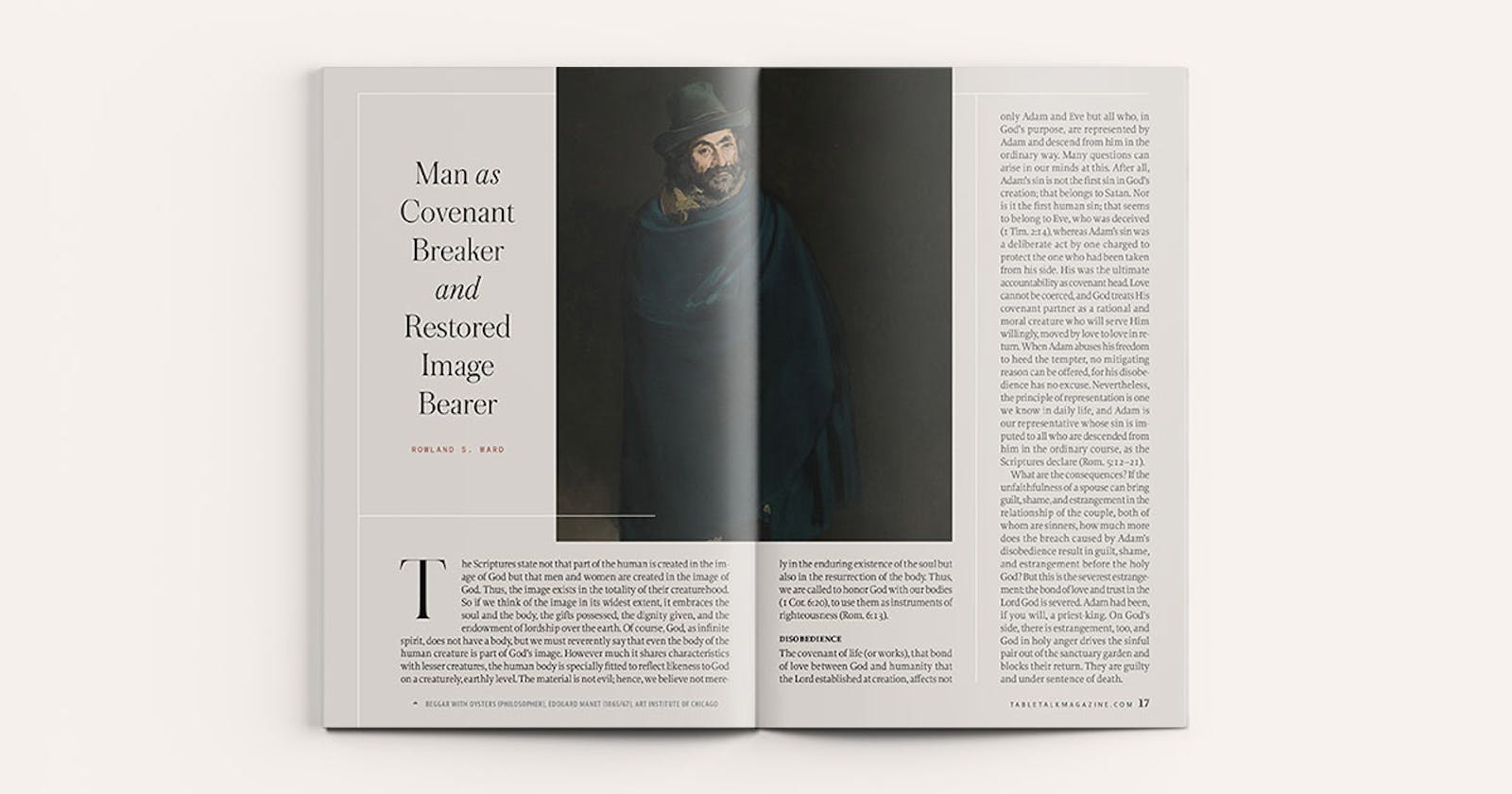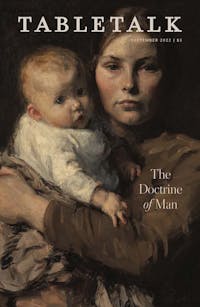
Request your free, three-month trial to Tabletalk magazine. You’ll receive the print issue monthly and gain immediate digital access to decades of archives. This trial is risk-free. No credit card required.
Try Tabletalk NowAlready receive Tabletalk magazine every month?
Verify your email address to gain unlimited access.
The Scriptures state not that part of the human is created in the image of God but that men and women are created in the image of God. Thus, the image exists in the totality of their creaturehood. So if we think of the image in its widest extent, it embraces the soul and the body, the gifts possessed, the dignity given, and the endowment of lordship over the earth. Of course, God, as infinite spirit, does not have a body, but we must reverently say that even the body of the human creature is part of God’s image. However much it shares characteristics with lesser creatures, the human body is specially fitted to reflect likeness to God on a creaturely, earthly level. The material is not evil; hence, we believe not merely in the enduring existence of the soul but also in the resurrection of the body. Thus, we are called to honor God with our bodies (1 Cor. 6:20), to use them as instruments of righteousness (Rom. 6:13).
disobedience
The covenant of life (or works), that bond of love between God and humanity that the Lord established at creation, affects not only Adam and Eve but all who, in God’s purpose, are represented by Adam and descend from him in the ordinary way. Many questions can arise in our minds at this. After all, Adam’s sin is not the first sin in God’s creation; that belongs to Satan. Nor is it the first human sin; that seems to belong to Eve, who was deceived (1 Tim. 2:14), whereas Adam’s sin was a deliberate act by one charged to protect the one who had been taken from his side. His was the ultimate accountability as covenant head. Love cannot be coerced, and God treats His covenant partner as a rational and moral creature who will serve Him willingly, moved by love to love in return. When Adam abuses his freedom to heed the tempter, no mitigating reason can be offered, for his disobedience has no excuse. Nevertheless, the principle of representation is one we know in daily life, and Adam is our representative whose sin is imputed to all who are descended from him in the ordinary course, as the Scriptures declare (Rom. 5:12–21).
What are the consequences? If the unfaithfulness of a spouse can bring guilt, shame, and estrangement in the relationship of the couple, both of whom are sinners, how much more does the breach caused by Adam’s disobedience result in guilt, shame, and estrangement before the holy God? But this is the severest estrangement: the bond of love and trust in the Lord God is severed. Adam had been, if you will, a priest-king. On God’s side, there is estrangement, too, and God in holy anger drives the sinful pair out of the sanctuary garden and blocks their return. They are guilty and under sentence of death.
how total is depravity?
Yet Adam and Eve still bear the divine image. They don’t become animals devoid of moral responsibility but remain humans without excuse and fully accountable. Their likeness to God, however, is marred in every part. All of Adam’s descendants continue to bear the image of the man of earth (1 Cor. 15:47). But death now has its hold on them body and soul. In the day they disobeyed, the sentence was passed, and the certainty of the sentence is expressed like a royal edict (Gen. 2:17; see 20:7). Dislocation in human relationships, painful toil, and sorrow are characteristic because of the rejection of the Lord God. Nor has man lost all gifts or all lordship over the creation, but now he acts not for the honor of the Creator but for his own praise. He was always to spread over the earth and subdue it, but now he often misuses creation because of his greed and lust for glory. Obstacles that he might otherwise have overcome weaken him. Ultimately, whatever his labor, he is defeated by the earth and returns to dust from which he came, his dignity reduced to the level of beasts that perish (Ps. 49:12).
When we speak of man’s total depravity, we are not saying that man is as bad as he could be or that there is no good in him at all. Rather, we are saying that every aspect of man is affected and marred by sin, and we are saying that there is no spiritual good in him (see Westminster Confession of Faith 16.7; Westminster Larger Catechism 25). He is dead in his trespasses and sins (Eph. 2:1). We recognize, however, that unbelievers still have gifts that the Lord in His goodness gives them as He gives to all (Ps. 145:9). Hiram, the pagan king of Tyre, had building skills lacking in Israel (1 Kings 5:6). A pagan poet may speak words worth quoting (Acts 17:28). An unbelieving doctor may have more skill than a Christian doctor. While we must not fail to recognize the humanity in others, the kindness and compassion they may show, which may outshine on the human level imperfectly sanctified Christians, we cannot abandon the reality that God looks on the heart and that everyone is a desperately needy sinner before a holy God.

god’s eternal plan
With humanity’s situation so grave, it is fitting to note that the rebellion of man, which is justly laid entirely to our account, is still part of the plan of God, and that plan does not put the first Adam at the forefront. Rather, Adam was the type or pattern of the One to come (Rom. 5:14), Jesus Christ. For God’s purpose with humanity created in His image contrasts with Jesus Christ, who is the image of the invisible God. He is the firstborn of all creation—that is, the One who has precedence, since “all things were created through him and for him” (Col. 1:15–16). Hebrews 1:3 similarly reminds us that Christ is “the radiance of the glory of God and the exact imprint of his nature, and he upholds the universe by the word of his power.” Because the Son of God has taken to His divine person a true human nature, we may rightly affirm that “in him all the fullness of God was pleased to dwell” (Col. 1:19). For the Son of God to be incarnated for the sake of those created in God’s image is not incongruous.
It is only in Jesus that humanity can reach its goal. The first Adam was created with a higher destiny to be realized by loving obedience. He failed the test, and that destiny became an unattainable goal for him. But those who are called according to God’s purpose are predestined to be conformed to the image of His Son, in order that He might be the firstborn (have preeminence) among many brothers (Rom. 8:29), so that Christ can say to the Father, “Behold, I and the children God has given me” (Heb. 2:13).
restoring the image
If Adam introduced the age of death for humanity through his disobedience, Jesus introduces the age of life: “Therefore, if anyone is in Christ, he is a new creation. The old has passed away; behold, the new has come” (2 Cor. 5:17). The first Adam’s failure involved a failure to obey the terms of the covenant—hence, the impossibility of reaching the goal of a perfected humanity in communion with God forever. Christ does not return us to Adam’s starting point, but by His obedience He achieves the “glorious inheritance” (Eph. 1:18) held out to Adam but forfeited. For those who are united to Christ by faith, this is the reality. Our sins are imputed to Christ, who died, “the righteous for the unrighteous” (1 Peter 3:18), and His righteousness is reckoned to our account. For the gospel is all about “the righteousness of God” (Rom. 1:17) and how He is “just and the justifier of the one who has faith in Jesus” (Rom. 3:26). The Spirit of God brings life from the dead to those for whom Christ died and rose again. No longer deciding what is right without heeding God’s Word, those united to Christ are renewed in knowledge (Col. 3:10); true righteousness and holiness follow (Eph. 4:24). The new life grows in likeness to Christ through the Spirit of God’s working by and with the Word in the fellowship of the church, Christ’s mystical body, where all gifts are to be used for the upbuilding of each other in love as we look for the blessed and glorious hope (Titus 2:13) and await our inheritance with Christ in God’s new heavens and earth where righteousness dwells (2 Peter 3:13).
